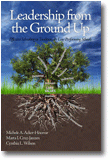
Leadership from the Ground Up
Effective Schooling in Traditionally Low Performing Schools
By:
Michele A. Acker-Hocevar, Washington State University
Marta I. Cruz-Janzen, Florida Atlantic University
Cynthia L. Wilson, Florida Atlantic University
A volume in the series: Issues in the Research, Theory, Policy, and Practice of Urban Education. Editor(s): Denise E. Armstrong, Brock University. William S. Ankomah, St. Francis Xavier University, Canada.
Published 2012
This book chronicles the journey of seven schools serving students of poverty, English Language Learners (ELLs), and students of color, which were able to sustain school improvement for a decade on either state and/or national criteria that measure student performance outcomes. The book shares stories of these seven schools and demonstrates that it takes an entire school working together with their communities, adding to the social and cultural capital of their students and families, to create and nurture what we call a Learning Partnership for sustainable school improvement.
The answers for how these schools sustained school improvement and are effective schools is evident from their school student metrics that validate the school’s ability to meet and sustain external mandates of high performance over time. The seven individual case stories illustrate that what matters most is what happens in the school itself. It is the internal culture of caring and respecting each other and working from an additive perspective of valuing students for their unique gifts and abilities, rather than exclusively focusing on increasing test scores that makes these school stories unique. This is not about heroic leadership but leadership spread out and shared among professionals working together to achieve common goals around shared values and beliefs. This book is about using resources in ways that value human capital as the greatest asset in the school to ensure that educators feel a sense of commitment, connection, and passion for their work together with students, their families, and their communities that enable them to excel together.
We offer readers seven cases that demonstrate there is no cookie cutter approach to having an effective school. Rather, there is a theory-in-practice that grounds the Learning Partnership depicted as a tree within a sustainable school improvement culture. This sustainable culture connects shared leadership and accountability, resourcefulness, a humanistic philosophy, additive schooling and results in an organization synergy that sustains organizational and collective efficacy for achieving results in these schools that other educators in schools with similar demographics are often unable to sustain or attain.
CONTENTS
Acknowledgements
Introduction
1 Let the Journey Begin!
2 The Conceptual Framework and Research Methodology:
Developing the Systems Alignment Model (SAM)
3 Show Me the Money
4 Whatever Works: Roll Up Your Sleeves and Get It Done Happily and Lovingly!
5 We Are Family
6 Everyone Has a Gift
7 Nothing Succeeds Like Success
8 We Focus on ALL the Children
9 Professional Development: This Is My Job!
10 The Learning Partnership Tree
11 Grounding a Theory: Sustainable School Improvement
12 The Journey Continues: What Else We Learned to Improve
Preparation Programs
Epilogue: Too Many Eggs in the FCAT Basket
Appendix A: Florida Schools’ Practices Interview Instrument
Appendix B: Florida Schools’ Practices Parent Interview
Instrument
About the Authors
References
Index
-
Paperback978-1-61735-650-6
Web price: $45.04 (Reg. 52.99)
-
Hardcover978-1-61735-651-3
Web price: $80.74 (Reg. 94.99)
- eBook978-1-61735-652-0

- EDU008000 - EDUCATION: Decision-Making & Problem Solving
- EDU003000 - EDUCATION: Aims & Objectives
- EDU032000 - EDUCATION: Leadership
-
 Convictions of Conscience
How Voices From the Margins Inform Public Actions and Educational Leadership
Convictions of Conscience
How Voices From the Margins Inform Public Actions and Educational Leadership
-
 Including Families and Communities in Urban Education
Including Families and Communities in Urban Education
-
 Schools as Radical Sanctuaries
Decolonizing Urban Education through the Eyes of Youth of Color
Schools as Radical Sanctuaries
Decolonizing Urban Education through the Eyes of Youth of Color
-
 Struggling for Inclusion
Educational Leadership in a Neo-Liberal World
Struggling for Inclusion
Educational Leadership in a Neo-Liberal World
-
 Student Engagement in Urban Schools
Beyond Neoliberal Discourses
Student Engagement in Urban Schools
Beyond Neoliberal Discourses
-
 Teach & Thrive
Wisdom from an Urban Teacher's Career Narrative
Teach & Thrive
Wisdom from an Urban Teacher's Career Narrative
-
 Working (With/out) the System
Educational Leadership, Micropolitics and Social Justice
Working (With/out) the System
Educational Leadership, Micropolitics and Social Justice

